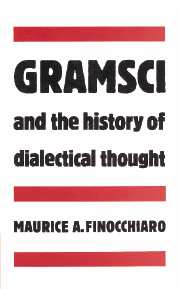Book contents
- Frontmatter
- Contents
- Preface and acknowledgments
- INTRODUCTION: AN APPROACH TO GRAMSCI
- Chapter 1 GRAMSCI'S CROCEAN CRITIQUE OF CROCE'S PHILOSOPHY
- Chapter 2 CROCE AND THE THEORY AND PRACTICE OF CRITICISM
- Chapter 3 GRAMSCI'S METHODOLOGICAL CRITICISM OF BUKHARIN'S SOCIOLOGY
- Chapter 4 BUKHARIN AND THE THEORY AND PRACTICE OF SCIENCE
- Chapter 5 GRAMSCI'S DIALECTICAL INTERPRETATION OF MACHIAVELLI'S POLITICS
- Chapter 6 GRAMSCI'S POLITICAL TRANSLATION OF HEGELIAN-MARXIAN DIALECTIC
- Chapter 7 HEGEL AND THE THEORY AND PRACTICE OF DIALECTIC
- Chapter 8 GRAMSCI AND THE EVALUATION OF MARXISM
- CONCLUSION: DIALECTICAL METHODOLOGY AND TEXTUAL CRITICISM
- Appendix: Concordance of critical edition and English translations
- Notes
- Bibliography
- Index
Chapter 1 - GRAMSCI'S CROCEAN CRITIQUE OF CROCE'S PHILOSOPHY
Published online by Cambridge University Press: 10 December 2009
- Frontmatter
- Contents
- Preface and acknowledgments
- INTRODUCTION: AN APPROACH TO GRAMSCI
- Chapter 1 GRAMSCI'S CROCEAN CRITIQUE OF CROCE'S PHILOSOPHY
- Chapter 2 CROCE AND THE THEORY AND PRACTICE OF CRITICISM
- Chapter 3 GRAMSCI'S METHODOLOGICAL CRITICISM OF BUKHARIN'S SOCIOLOGY
- Chapter 4 BUKHARIN AND THE THEORY AND PRACTICE OF SCIENCE
- Chapter 5 GRAMSCI'S DIALECTICAL INTERPRETATION OF MACHIAVELLI'S POLITICS
- Chapter 6 GRAMSCI'S POLITICAL TRANSLATION OF HEGELIAN-MARXIAN DIALECTIC
- Chapter 7 HEGEL AND THE THEORY AND PRACTICE OF DIALECTIC
- Chapter 8 GRAMSCI AND THE EVALUATION OF MARXISM
- CONCLUSION: DIALECTICAL METHODOLOGY AND TEXTUAL CRITICISM
- Appendix: Concordance of critical edition and English translations
- Notes
- Bibliography
- Index
Summary
It is readily apparent even to the casual reader of Gramsci's Notebooks, and it is generally admitted by scholars, that the critique of Croce's philosophy constitutes one of its central topics. It is also universally recognized that Gramsci's attitude toward Croce was not totally negative but partly appreciative and partly critical. The critical edition of the Notebooks now makes possible the detection and elaboration of two seldom discussed aspects of the Gramscian critique. One is that Gramsci is making a serious and partially successful attempt to understand Croce by putting forth an interesting and insightful interpretation of his philosophy; the second is that Gramsci's criticism is largely internal and logical, and hence more or less Crocean in a number of identifiable ways. Gramsci interprets Croce as first and foremost a critic of Marxism, but such that there remain strong Marxist, or at least Marxian, elements in Croce's thought. Gramsci's criticism of Croce is itself Crocean in the sense that it uses some Crocean elements against other Crocean elements. The accepted and used elements are Croce's definition of religion, his notion of the identity of history and philosophy, and his techniques of criticism. The rejected and criticized elements are Croce's liquidation of historical materialism as an old-fashioned theology, his dismissal of Marx as cognitively worthless, and his own philosophy of history and politics.
CROCE AND MARXISM
It would be an exaggeration to claim that Benedetto Croce was obsessed with Marxism throughout the long philosophical career (1893–1952) of his long life (1866–1952).
- Type
- Chapter
- Information
- Gramsci and the History of Dialectical Thought , pp. 8 - 27Publisher: Cambridge University PressPrint publication year: 1989

